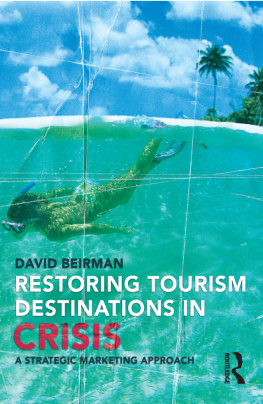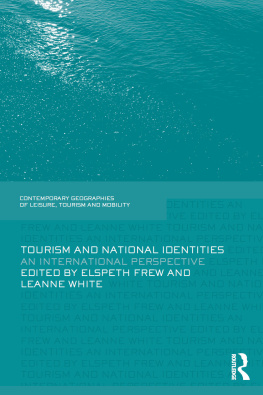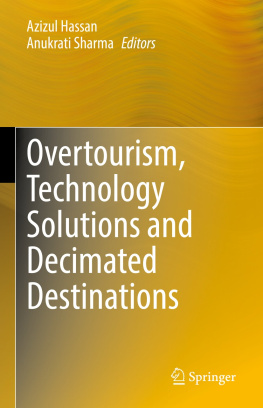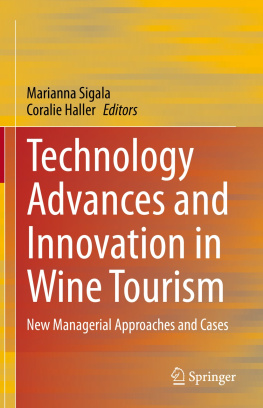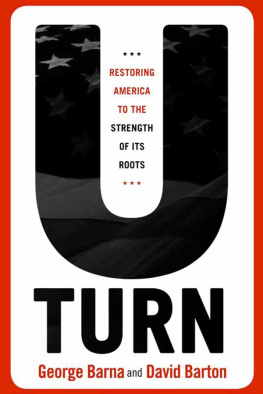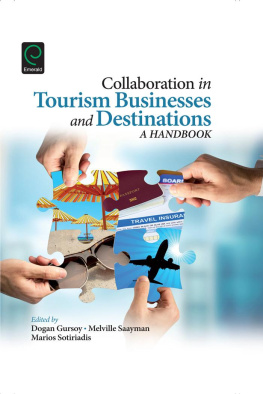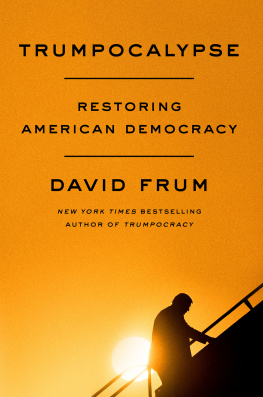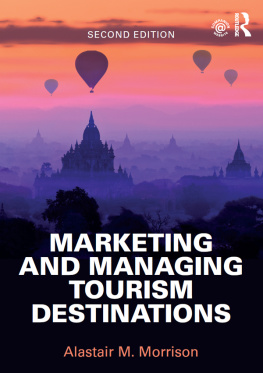David Beirman - Restoring Tourism Destinations in Crisis
Here you can read online David Beirman - Restoring Tourism Destinations in Crisis full text of the book (entire story) in english for free. Download pdf and epub, get meaning, cover and reviews about this ebook. year: 2003, publisher: Taylor and Francis, genre: Politics. Description of the work, (preface) as well as reviews are available. Best literature library LitArk.com created for fans of good reading and offers a wide selection of genres:
Romance novel
Science fiction
Adventure
Detective
Science
History
Home and family
Prose
Art
Politics
Computer
Non-fiction
Religion
Business
Children
Humor
Choose a favorite category and find really read worthwhile books. Enjoy immersion in the world of imagination, feel the emotions of the characters or learn something new for yourself, make an fascinating discovery.
- Book:Restoring Tourism Destinations in Crisis
- Author:
- Publisher:Taylor and Francis
- Genre:
- Year:2003
- Rating:3 / 5
- Favourites:Add to favourites
- Your mark:
- 60
- 1
- 2
- 3
- 4
- 5
Restoring Tourism Destinations in Crisis: summary, description and annotation
We offer to read an annotation, description, summary or preface (depends on what the author of the book "Restoring Tourism Destinations in Crisis" wrote himself). If you haven't found the necessary information about the book — write in the comments, we will try to find it.
Restoring Tourism Destinations in Crisis — read online for free the complete book (whole text) full work
Below is the text of the book, divided by pages. System saving the place of the last page read, allows you to conveniently read the book "Restoring Tourism Destinations in Crisis" online for free, without having to search again every time where you left off. Put a bookmark, and you can go to the page where you finished reading at any time.
Font size:
Interval:
Bookmark:

RESTORING TOURISM DESTINATIONS IN CRISIS
Dr David Beirman, BA Hons Dip Ed MA Hons Phd, is the founding Director of the Israel Tourism Office Australasia & Southwest Pacific. He is the first non-Israeli contracted by the Israel Ministry of Tourism to run an Israel Tourism office and has held the position since 1994. He is also the founder and inaugural chairman of the Eastern Mediterranean Tourism Association (Australia) which was established in 2001 to market and promote the region between Italy and Jordan (including Israel) to the travel industry and public. He is a board member of ANTOR (Association of National Tourist Office Representatives), Australia. David has been professionally involved in the travel industry tor over 20 years, including ten years working for Jetset Tours in a variety of roles ranging from travel consultant to personnel and in-service training manager. Since 1989 he has been the principal of his own training and management consultancy firm Struan & Associates, specialising in the travel industry. Dr Beirman has extensive university lecturing experience in the fields of Tourism, Market Research, Middle East Studies and Sociology. He has lectured at the University of Technology Sydney, the University of Sydney and the University of New South Wales and has guest lectured at many schools of tourism and professional and academic conferences and symposia in Australia, New Zealand, Singapore, Hong Kong, Canada and Israel. His articles on tourism crisis management have been published by international publications including the International Journal of Vacation Marketing and PATA's publication Compass. In September 2002 PATA invited him to join their crisis management advisory board. Outside the professional sphere, David enjoys travelling, bushwalking and exploring. He is based in Sydney.
A strategic marketing approach
DavidBeirman

First published 2003 by Allen & Unwin
Published 2020 by Routledge
2 Park Square, Milton Park, Abingdon, Oxon OX14 4RN605 Third Avenue, New York, NY 10017
Routledge is an imprint of the Taylor & Francis Group, an informa business
Copyright David Beirman 2003
All rights reserved. No part of this book may be reprinted or reproduced or utilised in any form or by any electronic, mechanical, or other means, now known or hereafter invented, including photocopying and recording, or in any information storage or retrieval system, without permission in writing from the publishers.
Notice:
Product or corporate names may be trademarks or registered trademarks, and are used only for identification and explanation without intent to infringe.
National Library of Australia
Cataloguing-in-Publication entry:
Beirman, David.
Restoring tourism destinations in crisis: a strategic
marketing approach.
Bibliography.
Includes index.
ISBN 1 86508 911 7.
1. TourismMarketing. 2. Crisis management. I. Title.
338.4791
Set in 11/13 pt Spectrum by Bookhouse, Sydney
ISBN-13: 9781865089119 (pbk)
- ANC African National Congress
- ASTA American Society of Travel Agents
- ATC Australian Tourism Commission
- BTA British Tourist Authority
- CTB Ceylon Tourist Board
- EMTA Eastern Mediterranean Tourism Association
- FAA Federal Airports Authority
- FVB Fiji Visitors Bureau
- IATA International Air Transport Association
- ICTO International Council of Tour Operators
- IGTO Israel Government Tourism Office
- IHA International Hotels Association
- MAFF Ministry of Agriculture, Fisheries and Food (UK)
- MEMTA Middle East and Mediterranean Tourism Association
- MICE meetings, incentives, conventions, exhibitions
- PAL Philippine Airlines
- PATA Pacific Asia Travel Association
- PCVC Philippines Convention and Visitor Corporation
- SAA South African Airways
- SATOUR South African Tourism
- TAG Tourism Action Group (Fiji)
- TCSP Tourism Council of the South Pacific
- TIA Tourism Industry Association
- TPC Tourism Policy Council
- TT Tourism Tasmania
- USTTA United States Travel and Tourism Authority
- VFR Visiting Friends and Relatives
- WTO World Tourism Organization
- WTTC World Travel and Tourism Council
There are many people who have provided invaluable assistance to the completion of this volume. First and foremost, I would like to thank Allen & Uliwin for having agreed to publish this book. A very special thanks to Elizabeth Weiss and Catherine Taylor who have so professionally and patiently guided me through the publication process. I have been fortunate in receiving generous cooperation from many of my fellow directors of national and state tourist offices based in Australia and some of their head office: colleagues. A very special thanks to Erdal Aktan Turkish Tourism Office; Virginia Haddon; South African Tourism; Deirdre Livingstone and her crisis management team from the BTA's London office; Sharon Hannaford and John Koldowski of PATA's Bangkok office; and to Perry Hobson, Head of School of Tourism and Leisure at Southern Cross University, Lismore who, along with John Koldowski, read and appraised the manuscript. Thanks also to Josaia Rayawa of the Fiji Visitors Bureau, Elhamy Elzayat, CEO and chairman Egyptian Association of Travel Agents, Cpnsuelo (Garcia Jones, from the Philippines Department of Tourism, Malcolm Wells of Tourism Tasmania and Barry Schipplock, Visit USA (Australia) and Daniel Young of USTTA Associates who carefully appraised my United States chapter.
A very special appreciation to my own colleagues from the Israel Ministry of Tourism in Jerusalem and in eighteen cities around the world with whom I have shared the experience of managing Israel's own tourism marketing crises. Ruth Eilat, Suzan Klagesbrun and Noga Sher-Greco have been at the forefront of managing Israel's tourism marketing challenges from the Israel end. A very special thanks to my inspirational research assistant Liz Angus, whose invaluable contribution in the form of ideas, information sourcing and editing at the initial manuscript stage helped shape this book. To all these people and many others, some of whom preferred not be named but who willingly gave of their time, effort and expertise to assist me with this book, I extend a heartfelt thanks.
To all my professional colleagues in both the travel industry and tourism academia, I hope your crises are few but you are well prepared to manage them and market your way to restoration and recovery. If this book helps at all in achieving that goal then the effort has been well worthwhile.
No tourism destination is immune from crisis. Consequently, the global tourism industry requires strategies and a set of directions which enable and prepare destination tourism authorities to manage a crisis event from its onset and rapidly implement a recovery strategy. The field of tourism crisis management is in its infancy and my overriding motivation for writing this book was to help fill some of the many gaps which exist in the literature. There remains enormous scope for future research in this subject.
The prime research focus is an analysis of the marketing dimension as it applies to specific crisis events: war, terrorism, natural disasters; crime waves and epidemics, and the appropriate restorative approaches. There is no doubt that destination crises arise from many causes including business collapse and industrial dispute. Destination restoration also involves a multitude of factors other than marketing. The issue of retraining and redeploying people whose livelihoods are affected by a crisis, though significant, is outside the scope of this work. The field of crisis management is very broad in scope and I have sought here to cover only those areas where I have specialist knowledge. Although the main topic covered is tourism destination marketing in crises, the principles of crisis management and restoration marketing apply to every business in which marketability is vulnerable to external crisis.
Font size:
Interval:
Bookmark:
Similar books «Restoring Tourism Destinations in Crisis»
Look at similar books to Restoring Tourism Destinations in Crisis. We have selected literature similar in name and meaning in the hope of providing readers with more options to find new, interesting, not yet read works.
Discussion, reviews of the book Restoring Tourism Destinations in Crisis and just readers' own opinions. Leave your comments, write what you think about the work, its meaning or the main characters. Specify what exactly you liked and what you didn't like, and why you think so.

